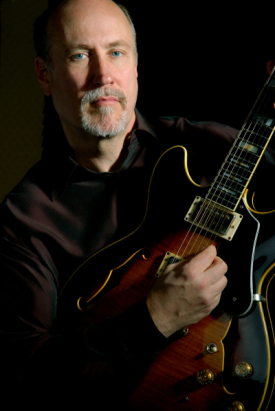Turnage’s “Scorched” ignites Orchestra Hall in triumphant melding of jazz and classical

It was eighty-five years ago that a sleazy clarinet solo and George Gershwin’s piano crashed into musical history, the premiere of Rhapsody in Blue ushering in a new era of classical works fused with jazz elements.
Since that celebated night at New York’s Aeolian Hall, the world has heard more jazz-classical hybrids than one can name, yet these works prove only rarely successful, and those were usually written by Gershwin or Leonard Bernstein.
Add Mark-Anthony Turnage to that very short list. Turnage’s Scorched, which had its American premiere Thursday night at Orchestra Hall, is a ground-breaking triumph. Inspired by the music of jazz guitarist John Scofield, and performed by Scofield’s trio, conductor Steven Sloane and the Chicago Symphony Orchestra, Scorched in an artful fusion of genres that preserves the blistering dynamism and improvisational essence of jazz while deftly and imaginatively drawing on the resources of a large symphony orchestra.
Like vandalized parking meters in downtown Chicago, the last century is littered with unsuccessful attempts to meld classical and jazz. Most fail to find a common ground that doesn’t soften or overinflate the jazz element or materially dilute the classical orchestra. Duke Ellington’s Three Black Kings, heard on Thursday’s first half, is representative, with the orchestra forming a kind of mega-big band accompaniment for jazz trio.
But Turnage’s Scorched is the real thing. The CSO’s Mead Composer in Residence, is a long-time admirer of Scofield and has crafted sixteen individual movements inspired by the jazz guitarist’s music. Even more than in his similarly conceived Blood on the Floor, Turnage displays striking ingenuity and originality in his deployment of the resources of jazz trio—and occasional quartet with saxophonist Jim Gailloreto—and large symphony orchestra.
In most hybrids, the orchestra and jazz musicians tend to exist in parallel universes, with elephantine symphonic tuttis stiffly backing jazz soloists. Yet Turnage intimately weaves the jazz players’ solos and orchestra together while his structure of self-contained movements provides moments for the jazz trio to shine as a unit and separately as individuals.
Even over eighty minutes, Turnage serves up such varied scoring combinations that Scorched doesn’t seem overlong. There are movements for the orchestra alone as with the Bridge-like string pizzicatos in Fat Lip I and the restless unsettled atmosphere of Kubrick.

Yet it is the jazz element that infuses Scorched, and it is Scofield’s remarkable guitar playing that is the heart of this work. The veteran musician mines an uncommon range of hues and expression, from the metal, driving edge of Fat Lip II to softly stealing in and accompanying the CSO strings in Away with Words. Turnage shows great skill and subtlety in his scoring, often scaling down the orchestra, as with Polo Towers for jazz trio and thirteen players or Scofield and just nine orchestra members in Nocturnal Mission.
The final sections segue from a solo “Cadenza” by Scofield, and Gil B643, a tribute to jazz arranger Gil Evans, to the Protocol finale, with jazz trio, saxophone and full orchestra providing a conclusive exhilarating blast.
Thursday night’s performance was a memorable one, with terrific playing by Scofield and his equally gifted colleagues, bassist John Patitucci and drummer Peter Erskine. The Zelig-like CSO morphed convincingly into a symphonic jazz band individually and collectively, with personality-plus solo work by several first chairs, particularly trumpeter Chris Martin and percussionist Cynthia Yeh. Give great credit to conductor Steven Sloane who brought off this music with full impact and assurance, the plugged-in jazz artists always well balanced with the unmiked orchestra. There is only one more performance Saturday night, and this is not one to miss.
Three Black Kings, heard on the first half is an example of why this kind of cross-pollination is so tricky to pull off, even by a jazz legend like Duke Ellington. The Duke remains one of the prolific and towering jazz figures of the last century, but his excursions into the symphonic realm remain more dutifully respected than performed.
While it offers much mercurial syncopated bustle, Three Black Kings comes alive only when the four jazz players hit their breakout solos. There’s great vitality to the central, high-stepping, King Solomon section, yet the effect remains pure jazz, with the resources of a large symphony orchestra grafted on.
Ellington does this more deftly than many, but Three Black Kings is largely a serviceable framework for fine jazz frontmen—Erskine and Patitucci here joined by saxophonist Donald Harrison Jr. and pianist Willie Pickens—and limited in its up-tempo character and expressive range. Even the final section, a tribute to Martin Luther King—completed by Ellington’s son Mercer after the composer’s death—remains more anonymously jaunty than moving or elegiac.
The program will be repeated 8 p.m. Saturday. 312-294-3000; www.cso.org.
Posted in Performances




